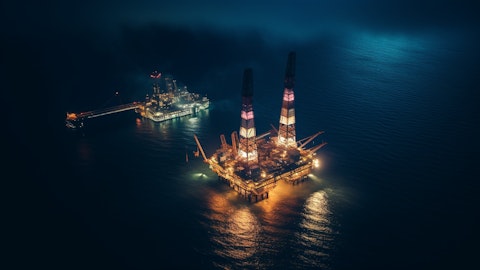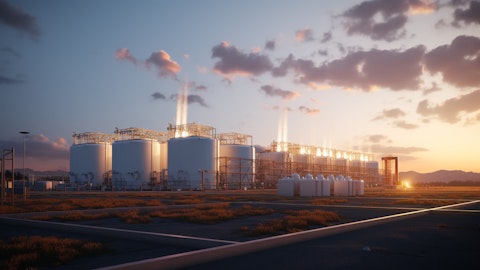So again, it gives us a lot of optionality. If you think about some of the other deals done in the market like in the regulated space recently, TC Energy did a pretty interesting deal with GIP. It was a deal done for assets, not as high quality as MVP at like 11 times EBITDA. BlackRock did a deal with Portland Gas recently also about 11 times EBITDA. Again, not as good of a quality asset as MVP. And when you think about just the regulated assets overall in Equitrans, call it, a $7 billion bucket of value. We could sell off some of those, we could sell off a minority interest, maintain control, maintain operatorship, there is a lot of different ways to structure it. And that is something we’re working through right now. But I think our confidence level in getting something done that maintains optionality both near-term and long-term while still ensuring we delever the balance sheet rapidly in a really efficient way is very, very high.
Michael Scialla: Good. Thanks for the detail.
Operator: [Operator Instructions] Your next question comes from Bert Donnes with Truist Securities. Please go ahead.
Bertrand Donnes: Hey. Good morning, guys. Just had a question on the potential divestitures. As you reduce debt, how price-sensitive are you? Is this this kind of the highest bidder wins? Or is this say, hey, if the bids are up to your expectations, you just kind of walk away.
Toby Rice: Yeah. As Jeremy mentioned, I mean, we have a ton of optionality and that means we’re going to continue to be really value focused on these things. So while there’s certainly — there’s a lot of interest here, which gives us a lot of confidence in completing this plan. I think you look at the Equinor transaction, we’re going to be getting some pretty good values for these assets.
Jeremy Knop: Yeah. If you step back and think about the time line, the rating agency has guided us towards it’s, call it, 12 to 18 months post-closing. We have guided closing to be probably a Q4 event. So we think about it as like we need to get through the deleveraging plan by the end of 2025, right? I think, most of us expect the market for gas in 2025 to be a lot more robust than it is today. So because we’re taking an opportunistic approach, we have good momentum right now. I feel very good that we get things done near term at very attractive values. But if we — if something happens, and we decide, hey, let’s be a little more patient, wait six months, wait nine months, there is no issue doing that to make sure we maximize value.
Bertrand Donnes: That makes sense. And then switching to the LNG agreement you announced. I just wanted to make sure I understood the strategy, right? This puts you at 45% of kind of your Gulf Coast exposure. Are you approaching the limit? Or is maybe there some understanding that, hey, you could go to 75% or so if you in the future plan to add some volumes that maybe had Gulf Coast exposure through a bolt-on or something like that? Or is there some number you guys have in your head where you kind of call it off or is 100% fine?
Toby Rice: Yeah. I think stepping back at a very high level, just from a market diversification perspective, we sort of soft circled around 10% of our volumes being exposed to international pricing, feels about right. And depending on the discussions with end buyers, we could toggle that number up or down. where we’re at right now, we’ve got about 10% of our numbers here. But keep in mind, these agreements are non-binding, and there’s some work to do to get the terms that allow us to achieve our objectives. So we have that level here, but maybe not all of those agreements will make it to the finish line, but we’ve got a lot of optionality, give us the ability to make sure we get the terms that we need.
Bertrand Donnes: Got you. And then this is a shot in the dark, and it’s related. I wouldn’t call it an extra question. Is there any push because of the data center demand that maybe you would take your foot off the pedal of LNG? Are there balancing forces there? Or are there are just kind of two positive outlooks that you’re looking at? That’s all I’ve got. Thanks.
Toby Rice: Yeah. It’s certainly another dynamic that we’re putting into consideration. And when we step back and we look at the opportunity, servicing the emerging market of LNG, we have capacity to do that with our existing pipes. But one of the great things about data center demand is Appalachia has proximity to that. And so when we talk about advocating for LNG, this is more of a tide is going to raise all ships and be constructive for long-term demand of natural gas demand in the U.S. But when it comes to data centers, our view is really how can we get more direct exposure to that rising demand. And so we positioned the company extremely favorably to be able to make sure that we can get differentiated access to this new opportunity set.
Things like positioning with MVP is great, showing the willingness to be first mover on doing large transformative gas supply deals that deliver reliable clean energy to customers. We’re fielding calls on that front. And so where we’re taking a much more targeted approach and leveraging our operation and commercial footprint to capture these opportunities in front of us.
Jeremy Knop: Yeah. I think it’s really important to remember, if you step back and think about these LNG deals. I mean, they are very long-term agreements. And if you just look at the time when the U.S. became an exporter of LNG from 2015 to 2020, was actually negative, right? So we expect over the long-term LNG to be a positive catalyst can add a lot of value. But if you sign up for too much LNG, and that ARB is negative for a couple of years, it’s like a very, very expensive pipeline contract, right? You can get yourself into trouble with that. You saw that happen in the past decade. And so we think about it from — you learned from the past, this is — it’s not the same as pipeline, but it is similar. And so we are taking a very prudent approach to it.





